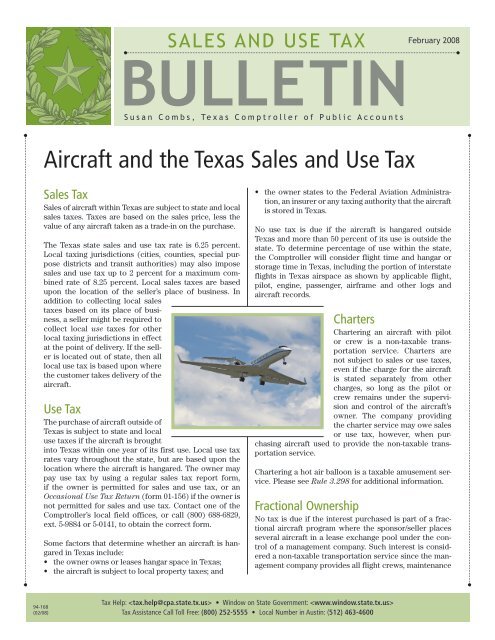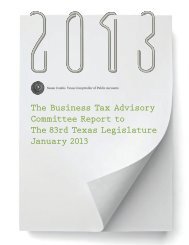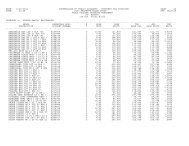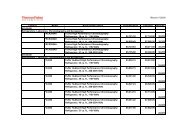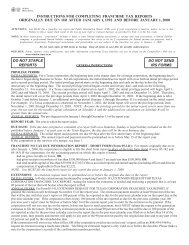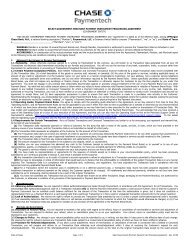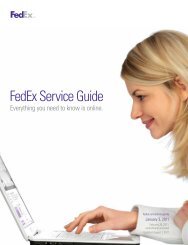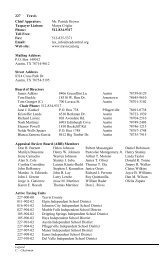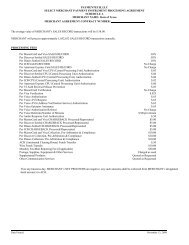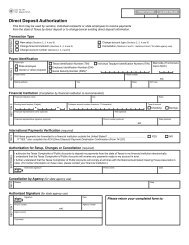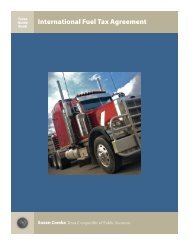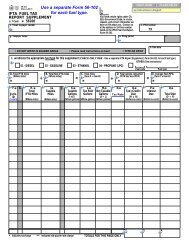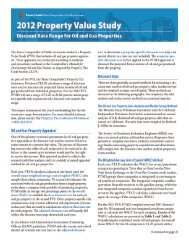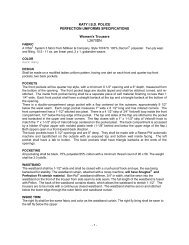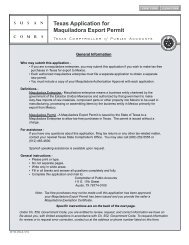94-168 Aircraft and Texas Sales and Use Tax - Texas Comptroller of ...
94-168 Aircraft and Texas Sales and Use Tax - Texas Comptroller of ...
94-168 Aircraft and Texas Sales and Use Tax - Texas Comptroller of ...
Create successful ePaper yourself
Turn your PDF publications into a flip-book with our unique Google optimized e-Paper software.
SALES AND USE TAX<br />
BULLETIN<br />
Susan Combs, <strong>Texas</strong> <strong>Comptroller</strong> <strong>of</strong> Public Accounts<br />
<strong>Aircraft</strong> <strong>and</strong> the <strong>Texas</strong> <strong>Sales</strong> <strong>and</strong> <strong>Use</strong> <strong>Tax</strong><br />
February 2008<br />
<strong>Sales</strong> <strong>Tax</strong><br />
<strong>Sales</strong> <strong>of</strong> aircraft within <strong>Texas</strong> are subject to state <strong>and</strong> local<br />
sales taxes. <strong>Tax</strong>es are based on the sales price, less the<br />
value <strong>of</strong> any aircraft taken as a trade-in on the purchase.<br />
The <strong>Texas</strong> state sales <strong>and</strong> use tax rate is 6.25 percent.<br />
Local taxing jurisdictions (cities, counties, special purpose<br />
districts <strong>and</strong> transit authorities) may also impose<br />
sales <strong>and</strong> use tax up to 2 percent for a maximum combined<br />
rate <strong>of</strong> 8.25 percent. Local sales taxes are based<br />
upon the location <strong>of</strong> the seller’s place <strong>of</strong> business. In<br />
addition to collecting local sales<br />
taxes based on its place <strong>of</strong> business,<br />
a seller might be required to<br />
collect local use taxes for other<br />
local taxing jurisdictions in effect<br />
at the point <strong>of</strong> delivery. If the seller<br />
is located out <strong>of</strong> state, then all<br />
local use tax is based upon where<br />
the customer takes delivery <strong>of</strong> the<br />
aircraft.<br />
<strong>Use</strong> <strong>Tax</strong><br />
The purchase <strong>of</strong> aircraft outside <strong>of</strong><br />
<strong>Texas</strong> is subject to state <strong>and</strong> local<br />
use taxes if the aircraft is brought<br />
into <strong>Texas</strong> within one year <strong>of</strong> its first use. Local use tax<br />
rates vary throughout the state, but are based upon the<br />
location where the aircraft is hangared. The owner may<br />
pay use tax by using a regular sales tax report form,<br />
if the owner is permitted for sales <strong>and</strong> use tax, or an<br />
Occasional <strong>Use</strong> <strong>Tax</strong> Return (form 01-156) if the owner is<br />
not permitted for sales <strong>and</strong> use tax. Contact one <strong>of</strong> the<br />
<strong>Comptroller</strong>’s local field <strong>of</strong>fices, or call (800) 688-6829,<br />
ext. 5-9884 or 5-0141, to obtain the correct form.<br />
Some factors that determine whether an aircraft is hangared<br />
in <strong>Texas</strong> include:<br />
• the owner owns or leases hangar space in <strong>Texas</strong>;<br />
• the aircraft is subject to local property taxes; <strong>and</strong><br />
• the owner states to the Federal Aviation Administration,<br />
an insurer or any taxing authority that the aircraft<br />
is stored in <strong>Texas</strong>.<br />
No use tax is due if the aircraft is hangared outside<br />
<strong>Texas</strong> <strong>and</strong> more than 50 percent <strong>of</strong> its use is outside the<br />
state. To determine percentage <strong>of</strong> use within the state,<br />
the <strong>Comptroller</strong> will consider flight time <strong>and</strong> hangar or<br />
storage time in <strong>Texas</strong>, including the portion <strong>of</strong> interstate<br />
flights in <strong>Texas</strong> airspace as shown by applicable flight,<br />
pilot, engine, passenger, airframe <strong>and</strong> other logs <strong>and</strong><br />
aircraft records.<br />
Charters<br />
Chartering an aircraft with pilot<br />
or crew is a non-taxable transportation<br />
service. Charters are<br />
not subject to sales or use taxes,<br />
even if the charge for the aircraft<br />
is stated separately from other<br />
charges, so long as the pilot or<br />
crew remains under the supervision<br />
<strong>and</strong> control <strong>of</strong> the aircraft’s<br />
owner. The company providing<br />
the charter service may owe sales<br />
or use tax, however, when purchasing<br />
aircraft used to provide the non-taxable transportation<br />
service.<br />
Chartering a hot air balloon is a taxable amusement service.<br />
Please see Rule 3.298 for additional information.<br />
Fractional Ownership<br />
No tax is due if the interest purchased is part <strong>of</strong> a fractional<br />
aircraft program where the sponsor/seller places<br />
several aircraft in a lease exchange pool under the control<br />
<strong>of</strong> a management company. Such interest is considered<br />
a non-taxable transportation service since the management<br />
company provides all flight crews, maintenance<br />
<strong>94</strong>-<strong>168</strong><br />
(02/08)<br />
<strong>Tax</strong> Help: • Window on State Government: <br />
<strong>Tax</strong> Assistance Call Toll Free: (800) 252-5555 • Local Number in Austin: (512) 463-4600
SALES AND USE TAX<br />
BULLETIN<br />
<strong>Aircraft</strong> <strong>and</strong> the <strong>Texas</strong> <strong>Sales</strong> <strong>and</strong> <strong>Use</strong> <strong>Tax</strong><br />
<strong>and</strong> administrative services required to operate the aircraft.<br />
The sponsor/seller cannot purchase aircraft used<br />
in the program tax-free for resale.<br />
<strong>Tax</strong> is due, however, if the co-owners either fly the aircraft<br />
themselves or directly hire <strong>and</strong> fire the flight crew.<br />
Exemptions<br />
No sales <strong>and</strong> use tax is due if the aircraft is purchased,<br />
leased, or rented by a:<br />
• Licensed <strong>and</strong> certificated carrier.<br />
The carrier must be authorized by the Federal Aviation<br />
Administration (FAA) to operate as a common or<br />
contract carrier <strong>and</strong> must use the aircraft exclusively<br />
to transport persons or property for hire in the regular<br />
course <strong>of</strong> business.<br />
• Flight school or flight instructor.<br />
The FAA recognized school or certified instructor must<br />
use the aircraft exclusively for FAA-approved flight<br />
instruction. The exemption includes flight simulation<br />
training devices. A student may rent an aircraft tax<br />
free for exclusive use in FAA-approved flight instruction.<br />
Please see <strong>Texas</strong> <strong>Tax</strong> Code,<br />
Section 151.328 for complete exemption<br />
qualifications.<br />
• Person for use <strong>and</strong> registration<br />
in another state or nation<br />
before any use in <strong>Texas</strong>.<br />
The purchase <strong>of</strong> an aircraft is exempt<br />
if sold in <strong>Texas</strong> to a person<br />
for use <strong>and</strong> registration in another<br />
state or nation before any use <strong>of</strong><br />
the aircraft is made in <strong>Texas</strong> other<br />
than flight training in the aircraft<br />
or the transportation <strong>of</strong> the aircraft<br />
out <strong>of</strong> this state.*<br />
Note: Bringing the aircraft back<br />
into <strong>Texas</strong> for training, repair or<br />
refurbishment is not considered<br />
divergent use.<br />
• Foreign government.<br />
* At the time <strong>of</strong> sale, both the seller <strong>and</strong> the purchaser<br />
must sign the <strong>Texas</strong> <strong>Aircraft</strong> Exemption Certificate<br />
(form 01-907). A copy <strong>of</strong> the completed certificate<br />
should be sent to:<br />
<strong>Texas</strong> <strong>Comptroller</strong><br />
Business Activity Research Team<br />
P.O. Box 13003<br />
Austin, <strong>Texas</strong> 78711-3003<br />
A person who claims an exemption should issue a completed<br />
exemption certificate to the seller to document<br />
that no tax is due on the sale.<br />
An owner renting or leasing aircraft must have a sales<br />
tax permit in order to purchase the aircraft tax-free for<br />
resale. If the owner rents or leases an aircraft to a lessee<br />
who claims an exemption, the owner must accept <strong>and</strong><br />
keep a completed exemption certificate to document the<br />
fact that no tax is due on the lease or rental.<br />
A person who claims an exemption <strong>and</strong> then uses an aircraft<br />
for a non-exempt purpose must remit use tax based<br />
on the fair market rental value for the period <strong>of</strong> nonexempt<br />
use. The person may choose to cease paying tax<br />
on the fair market rental value at any time <strong>and</strong> instead<br />
pay the sales tax on the original purchase price, without<br />
credit for any taxes previously paid.<br />
Exemption as Occasional Sale<br />
The purchase <strong>of</strong> an aircraft may also be exempt if it is<br />
purchased from a non-permitted seller who makes an<br />
occasional sale. An “occasional sale”<br />
is one made by a person who does<br />
not habitually engage in the business<br />
<strong>of</strong> selling taxable items <strong>and</strong> who<br />
sells no more than two taxable items<br />
during a twelve-month period. To<br />
document the exemption, a purchaser<br />
should ask the seller to provide<br />
a signed statement that the transaction<br />
qualifies for the occasional<br />
sale exemption as defined in <strong>Texas</strong><br />
Administrative Code Rule 3.316(b).<br />
The statement must be specific as<br />
to why the exemption applies (e.g.,<br />
operating asset, transfer without<br />
change in ownership, etc.) The purchaser<br />
must retain the statement in<br />
their records for four years following<br />
the date <strong>of</strong> the purchase.<br />
Occasional sale exemptions do not apply to leases <strong>and</strong><br />
rentals, <strong>and</strong> cannot be made by sellers who have sales tax<br />
permits in <strong>Texas</strong> or similar licenses or permits in any other<br />
state. See <strong>Texas</strong> Administrative Code Rule 3.316 (c).<br />
A person who holds a sales tax permit must pay use tax<br />
on an aircraft purchased from a person who does not<br />
hold a sales tax permit <strong>and</strong> who has sold two or fewer<br />
Susan Combs • <strong>Texas</strong> <strong>Comptroller</strong> <strong>of</strong> Public Accounts<br />
2 <strong>Tax</strong> Help: tax.help@cpa.state.tx.us • Window on State Government: www.window.state.tx.us
SALES AND USE TAX<br />
BULLETIN<br />
<strong>Aircraft</strong> <strong>and</strong> the <strong>Texas</strong> <strong>Sales</strong> <strong>and</strong> <strong>Use</strong> <strong>Tax</strong><br />
taxable items during the 12-month period immediately<br />
prior to the sale.<br />
Exemption as an Identifiable Segment<br />
<strong>of</strong> a Business<br />
The purchase <strong>of</strong> an aircraft may be exempt from sales<br />
or use tax if, prior to the sale <strong>of</strong> the aircraft, the income<br />
<strong>and</strong> expenses attributable to the aircraft can be separately<br />
established from the books <strong>of</strong> account or record.<br />
“Income” is revenue generated by the aircraft, <strong>and</strong><br />
“expenses” means those operating<br />
expenses incurred in providing the<br />
aircraft rental or service.<br />
The purchaser <strong>and</strong> seller must<br />
keep records to document such an<br />
exemption.<br />
Maintenance <strong>and</strong> Repair<br />
Labor charges to repair, remodel,<br />
maintain or restore an aircraft are<br />
not taxable. For example, a labor<br />
charge to replace a tire or avionics on<br />
an aircraft is not subject to sales tax.<br />
When a repairer bills a single charge<br />
for parts <strong>and</strong> labor, the repairer<br />
should not collect sales tax from the<br />
customer. The repairer should pay tax, however, when<br />
buying the parts from the supplier.<br />
If the invoice separates charges for labor <strong>and</strong> parts, the<br />
repairer should collect tax on the parts. There is no sales<br />
tax on the labor charges. When buying parts from its<br />
supplier, the repairer may give a Resale Certificate (form<br />
01-339) in lieu <strong>of</strong> paying sales tax.<br />
A repairer who performs services under an extended<br />
warranty must collect sales tax on separately stated<br />
charges for parts. A repairer performing an extended<br />
warranty that does not separately state <strong>and</strong> bill for materials<br />
should pay tax when buying the parts from the supplier.<br />
No sales tax is due on parts furnished by a manufacturer<br />
for repairs under a manufacturer’s warranty.<br />
<strong>Tax</strong> is due on consumable supplies, tools <strong>and</strong> equipment<br />
(not incorporated into the aircraft) used in repairs<br />
for customers other than certificated carriers or flight<br />
schools. The person making repairs should pay tax to the<br />
supplier <strong>and</strong> may not collect tax from customers on any<br />
charges for these items.<br />
No sales tax is due on component<br />
parts for aircraft exempt from sales<br />
tax. (See Exemptions above.) The<br />
exemption covers such things as air<br />
cargo containers that are secured<br />
or attached to the aircraft while in<br />
flight, radar equipment or other electronic<br />
devices used for navigational<br />
or communications purposes, food<br />
carts, smoke detectors, fire extinguishers,<br />
seats, battery chargers <strong>and</strong><br />
diagnostic equipment. The exemption<br />
does not apply, however, to<br />
machinery, tools <strong>and</strong> equipment that<br />
support the overall aviation operation,<br />
such as baggage loading <strong>and</strong><br />
h<strong>and</strong>ling, garbage <strong>and</strong> other waste<br />
disposal <strong>and</strong> booking reservations.<br />
Repair Of Jet Turbines<br />
No tax is due on machinery, equipment or replacement<br />
parts <strong>and</strong> accessories with a useful life <strong>of</strong> more than six<br />
months used to overhaul or repair jet turbine aircraft<br />
engines. The exemption covers aluminum oxide, nitric<br />
acid <strong>and</strong> sodium cyanide used in electrochemical plating,<br />
as well as electricity or natural gas used in the <strong>of</strong>f-wing<br />
processing, overhaul or repair <strong>of</strong> a jet turbine engine or<br />
its parts for a licensed <strong>and</strong> certificated carrier.<br />
The <strong>Texas</strong> <strong>Comptroller</strong> <strong>of</strong> Public Accounts is an equal opportunity employer <strong>and</strong> does not discriminate on the basis <strong>of</strong> race, color, religion, sex, national origin, age, or disability in<br />
employment or in the provision <strong>of</strong> any services, programs, or activities.<br />
In compliance with the Americans with Disabilities Act, this document may be requested in alternative formats by calling the toll-free number listed at the bottom <strong>of</strong> page 1, or by calling<br />
(512) 463-4600 in Austin, (512) 475-0900 (FAX).<br />
Susan Combs • <strong>Texas</strong> <strong>Comptroller</strong> <strong>of</strong> Public Accounts<br />
<strong>Tax</strong> Help: tax.help@cpa.state.tx.us • Window on State Government: www.window.state.tx.us 3
Appendix 1: Form 01-907<br />
<strong>Comptroller</strong><br />
<strong>of</strong> Public<br />
Accounts<br />
FORM<br />
01-907<br />
(Rev.12-01/3)<br />
TEXAS AIRCRAFT EXEMPTION CERTIFICATE<br />
OUT-OF-STATE REGISTRATION AND USE<br />
Under Ch. 559, Government Code, you are entitled to review, request, <strong>and</strong> correct information we have on file about you, with limited exceptions in accordance<br />
with Ch. 552, Government Code. To request information for review or to request error correction, contact us at the address or toll-free number listed on this form.<br />
Name <strong>of</strong> purchaser<br />
Address (Street & number <strong>and</strong> P.O. Box number)<br />
Phone (Area code & number)<br />
City, State, ZIP code<br />
Name <strong>of</strong> seller<br />
Seller’s <strong>Texas</strong> sales tax permit number<br />
Address (Street & number <strong>and</strong> P.O. Box number)<br />
Phone (Area code & number)<br />
City, State, ZIP code<br />
The undersigned hereby certifies that the aircraft described below was purchased on __________________________<br />
Date <strong>of</strong> sale<br />
for a total sales price <strong>of</strong> $ _____________________ <strong>of</strong> which $ ______________________ was allowed as a trade-in,<br />
resulting in a net sales price <strong>of</strong> $ _____________________ .<br />
<strong>Aircraft</strong> make Model Serial number FAA registration number (Tail number)<br />
The aircraft will be registered in _____________________, ______ as recorded with Federal Aviation Administration.<br />
City<br />
State<br />
The aircraft will be hangared in _____________________, ______ <strong>and</strong> is not purchased for use in <strong>Texas</strong>.<br />
City<br />
State<br />
My correct mailing <strong>and</strong> location address are __________________________________________________________<br />
Mailing address<br />
_____________________________________________________________________________________________<br />
Location address<br />
I claim an exemption from the <strong>Texas</strong> sales tax pursuant to <strong>Texas</strong> <strong>Tax</strong> Code Section 151.328(a)(4) because the aircraft<br />
is purchased for registration <strong>and</strong> use outside <strong>Texas</strong>.<br />
I underst<strong>and</strong> that by signing this form, I am authorizing the <strong>Texas</strong> <strong>Comptroller</strong> <strong>of</strong> Public Accounts to furnish copies to<br />
<strong>of</strong>ficials <strong>of</strong> my home state. I underst<strong>and</strong> that the purpose <strong>of</strong> providing this information to <strong>of</strong>ficials <strong>of</strong> my home state is<br />
to facilitate the enforcement <strong>of</strong> any taxes imposed on the purchase or use <strong>of</strong> the aircraft in my home state.<br />
I underst<strong>and</strong> that it is a misdemeanor punishable by a fine not to exceed $500 to provide this certificate <strong>of</strong> exemption if<br />
I know the aircraft will be used in a manner other than for registration <strong>and</strong> use outside <strong>Texas</strong>.<br />
Purchaser’s signature<br />
Date<br />
Seller’s signature<br />
Date<br />
(Original to be retained by seller, seller to send copy to the <strong>Texas</strong> <strong>Comptroller</strong> <strong>of</strong> Public Accounts, Business Activity Research Team, P.O. Box 13003, Austin,<br />
<strong>Texas</strong>, 78711-3003, <strong>and</strong> copy to the Purchaser.)<br />
Susan Combs • <strong>Texas</strong> <strong>Comptroller</strong> <strong>of</strong> Public Accounts<br />
4 <strong>Tax</strong> Help: tax.help@cpa.state.tx.us • Window on State Government: www.window.state.tx.us


